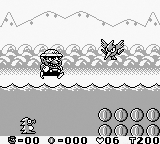Wario Land: Super Mario Land 3: Difference between revisions
mNo edit summary |
m (→Enemies) |
||
| Line 51: | Line 51: | ||
*[[Rat]] | *[[Rat]] | ||
*[[Flying Bomb]] | *[[Flying Bomb]] | ||
*[[ | *[[White Puff]] | ||
*[[Mole (Wario Land)|Mole]] | *[[Mole (Wario Land)|Mole]] | ||
*[[Hermit Crab]] | *[[Hermit Crab]] | ||
Revision as of 20:31, September 23, 2009
It has been requested that this article be rewritten.
Template:Infobox Wario Land: Super Mario Land 3 is a game released for the Gameboy in 1994, and is a sequel to Super Mario Land 2: Six Golden Coins. However, "Super Mario Land 3" is a somewhat misleading title, as the game is not really about Mario at all, but rather about Wario. Mario does, however, make a cameo at the end of the game, stealing the statue Wario worked so hard to collect. However, Wario does get his own house or castle (and at the highest amount, a whole planet) as a reward for saving Kitchen Island.
Desiring a castle of his own, Wario sets out to find a lost golden statue of Princess Toadstool that he intends to ransom to her for the money to buy his own castle. Along the way he gladly collects any other gold coins and treasures he finds. The game is spent navigating a number of levels to reclaim his lost treasures, and has a significant level of replayability due to the branched path many of the levels take.
Wario starts out on Rice Beach, a small area of Kitchen Island. On the map screen, the player will notice that Kitchen Island is shaped like a skull, and a skull theme is present throughout the game. The save points are skulls, as are the level exits, secret doors, etc.
Worlds
- Rice Beach
- Boss: Spike Bro.
- Mt. Teapot
- Boss: Biifun
- Sherbet Land
- Boss: Hinyari
- Stove Canyon
- Boss: Funfun
- SS Tea Cup
- Boss: Bobo
- Parsely Woods
- Boss: Zenisukii
- Syrup Castle
- Boss: Denpuu
Enemies
- Wanderin' Goom
- Pirate Goom
- Dropper
- Pinwheel
- Helmut
- Pouncer
- Penkoon
- Dangerous Duck
- Bucket Head
- Floater
- Pelican
- Bird
- Walrus
- Rat
- Flying Bomb
- White Puff
- Mole
- Hermit Crab
- Ghost Goom
- Thundercloud
- Demon Bat
- Fireballs
- Gator
- Boulder
- Bee
- Chicken Bakku
- Webber
- Spiked Ball
- Piranha Plant
- Muncher
- Porcupine Fish
Reception
Although it didn't sell as well as its Mario Land predecessors, the game received mostly favorable reviews. The game placed 71st in the 100th issue of Nintendo Power's "100 best Nintendo games of all time" in 1997.[1] Template:Sectionstub
Warioware Smooth Moves
A mirco game call Warioland is one of 9-Volt's and 18-Volt's games. In it, the player has Wario hold a Pirate Goom and throw it at blocks, Porcupine Fish, Pirate Gooms, Dropper, and Demon Bat are some of the enemys that appear.
Trivia
- In "Warioland," a microgame from Wario Ware: Smooth Moves, when Wario defeats an enemy by throwing, a coin pops out. In the original game, coins only appear out of enemies when Wario shoulder bashes into them.
References
Template:Mario Land Template:WarioGames
| Game Boy games | |
|---|---|
| Super Mario franchise | Alleyway (1989) • Baseball (1989) • Super Mario Land (1989) • Golf (1989) • Dr. Mario (1990) • Super Mario Land 2: 6 Golden Coins (1992) • Donkey Kong (1994) • Mario's Picross (1995) • Picross 2 (1996) |
| Donkey Kong franchise | Donkey Kong (1994) • Donkey Kong Land (1995) • Donkey Kong Land 2 (1996) • Donkey Kong Land III (1997) |
| Yoshi franchise | Yoshi (1991) • Yoshi's Cookie (1992) • Tetris Attack (1996) |
| Wario franchise | Wario Land: Super Mario Land 3 (1994) • Wario Blast: Featuring Bomberman! (1994) • Wario Land II (1998) |
| Miscellaneous | Tetris (1989) • The Legend of Zelda: Link's Awakening (1993) • Game & Watch Gallery (1997) • Game & Watch Gallery 2 (1997) |
